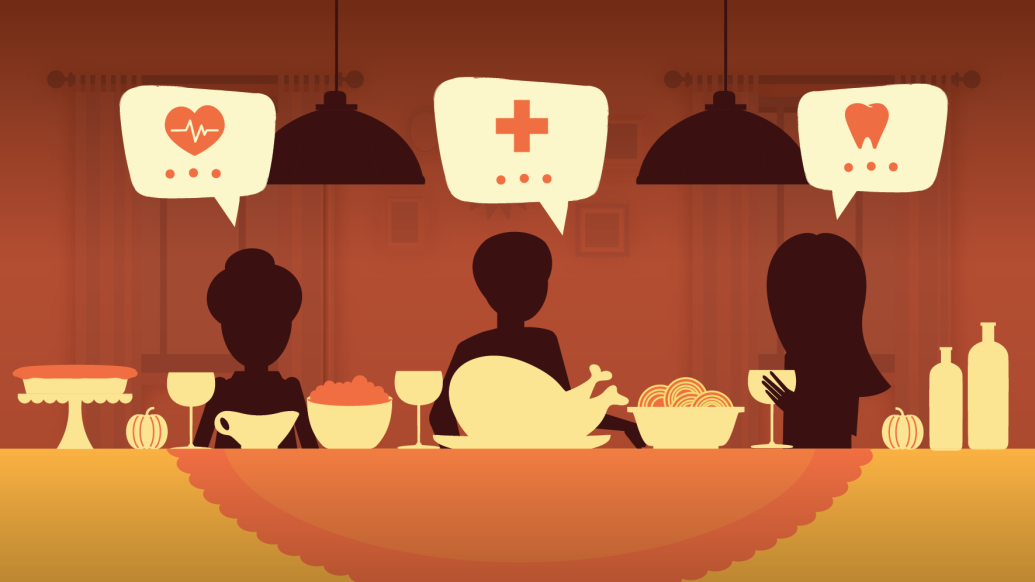The holidays provide an ideal time to open lines of communication about how cancer and other disease histories may impact loved one’s health journeys
5:00 AM
Author |

This article originally published on November 22, 2016 and was updated November 21, 2023.
Listen to the podcast of this article: Family Health History as Cancer Prevention
There's no better time to talk about your family's health history than when your loved ones are sitting around the table together.
That's the idea behind the United States surgeon general's declaration of Thanksgiving Day as National Family Health History Day.
Since the campaign started in 2004, Americans have been encouraged to use the holiday as a time to talk about — and record — any health problems, especially those that seem to run in their families.
Sharing this information among as many people as possible could save someone's life.
Family history, after all, is one of the main factors used to determine an individual's risk for developing diseases, including cancer.
Many patients do not know that they are at risk before talking with a family member.
For example, a diagnosis of breast cancer, colon cancer or even colon polyps in a close relative can have an impact on the age to start screening.
Furthermore, in families with multiple individuals affected with breast cancer, colon cancer, ovarian cancer, and/or uterine cancer, there is a chance that an inherited gene mutation may be playing a role.
Hereditary cancer syndromes, which account for up to 1 in 10 cancer diagnoses, can significantly increase a person's risk for developing cancer.
Armed with the knowledge of this type of background information, physicians can intervene by screening patients earlier and more frequently in an effort to prevent or minimize their cancer risk.
Learning the extent of various conditions have impacted your family health history can be a challenge for some, especially when relatives are deceased or unwilling to share.
For people who are adopted, this task can present an even bigger challenge. Initiating conversations about family health history when larger groups of family are present offers an opportunity to begin understanding what, if any, health conditions appear more commonly across your family
MORE FROM THE HEALTH BLOG: Subscribe to our weekly newsletter
While family history is only one part of your total health picture, having a full understanding of how cancer has impacted your family over the generations can frame the picture in a whole new way.
Here are a few ways to get started.
6 ways to talk about family health history at Thanksgiving
1. Give a heads-up. Mail, email or text a note ahead of time to prepare everyone on what to expect.
The Centers for Disease Control and Prevention created this Health-e-Card to break the ice.
2. Go first. Anyone can start the conversation, so why not you? The surgeon general recommends answering and asking the following questions:
- Do you have any chronic illnesses, such as heart disease, high blood pressure or diabetes?
- Have you had any other serious illnesses, such as cancer or stroke?
- How old were you when you developed these illnesses?
- Have you or your partner had any difficulties with pregnancies?
- Have you or anyone in the family suffered from mental illness such as anxiety, clinical depression or bipolar disorder?
- What medications are you currently taking?
3. Include everyone. Be sure to talk with all of your blood relatives: parents, siblings, children, grandparents, cousins, aunts, uncles, nieces, nephews and half-siblings.
You can also ask questions about other relatives, both living and deceased, such as:
- What is our family's ancestry? What country(-ies) did we come from?
- Has anyone in the family had learning or developmental disabilities?
- What illnesses did our late grandparents have?
- How old were they when they died?
- What caused their deaths?
4. Take notes. Offer to be the family historian by recording the information shared at the table.
Some family members may not feel comfortable sharing their health information.
You can reassure them that any information they provide will be helpful. When it comes to understanding your family’s cancer history, knowing the type of cancer and approximate age of diagnosis is important.
SEE ALSO: 6 Safety Pitfalls to Avoid on Thanksgiving
5. Compile and organize. The Michigan Genetic Hereditary Testing Project’s Family Health History Tool offers a free, secure, and HIPPA-compliant to anyone in the state of Michigan to track their family’s cancer history.
Data entered into the survey is automatically saved and, upon submitting, the user is able to print out or save a report of their personal and family history of cancer to share with their family members and trusted health care professionals.
The report even provides an image of their family tree with cancer diagnoses indicated.
6. Share with others. Information collected at the family table can be reviewed by those who are present and sent to those who live out of town.
Online tools may allow you to add additional information as you receive it too.
Check out the Family Health History Tool today and give your family a tremendous gift this gathering season.
The gift of knowledge that may possibly extend your gift into a longer life.

Explore a variety of health care news & stories by visiting the Health Lab home page for more articles.

Department of Communication at Michigan Medicine
Want top health & research news weekly? Sign up for Health Lab’s newsletters today!





